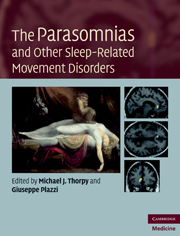Book contents
- The Parasomnias and Other Sleep-Related Movement Disorders
- The Parasomnias and Other Sleep-Related Movement Disorders
- Copyright page
- Contents
- Contributors
- Preface
- Credits and Acknowledgments
- Foreword
- Section 1 Introduction
- Section 2 Disorders of arousal
- Section 3 Parasomnias usually associated with REM sleep
- Section 4 Other parasomnias
- Section 5 Sleep-related movement disorders and other variants
- Chapter 22 Restless legs syndrome (RLS) and periodic leg movements (PLM)
- Chapter 23 Sleep starts
- Chapter 24 Fragmentary myoclonus
- Chapter 25 Sleep-related leg cramps
- Chapter 26 Sleep-related bruxism
- Chapter 27 Propriospinal myoclonus
- Chapter 28 Sleep-related rhythmic movement disorder
- Chapter 29 Sleep panic arousals
- Chapter 30 Sleep-related epilepsy
- Section 6 Therapy of parasomnias
- Index
Chapter 30 - Sleep-related epilepsy
from Section 5 - Sleep-related movement disorders and other variants
Published online by Cambridge University Press: 10 November 2010
- The Parasomnias and Other Sleep-Related Movement Disorders
- The Parasomnias and Other Sleep-Related Movement Disorders
- Copyright page
- Contents
- Contributors
- Preface
- Credits and Acknowledgments
- Foreword
- Section 1 Introduction
- Section 2 Disorders of arousal
- Section 3 Parasomnias usually associated with REM sleep
- Section 4 Other parasomnias
- Section 5 Sleep-related movement disorders and other variants
- Chapter 22 Restless legs syndrome (RLS) and periodic leg movements (PLM)
- Chapter 23 Sleep starts
- Chapter 24 Fragmentary myoclonus
- Chapter 25 Sleep-related leg cramps
- Chapter 26 Sleep-related bruxism
- Chapter 27 Propriospinal myoclonus
- Chapter 28 Sleep-related rhythmic movement disorder
- Chapter 29 Sleep panic arousals
- Chapter 30 Sleep-related epilepsy
- Section 6 Therapy of parasomnias
- Index
Summary
Keywords
- Type
- Chapter
- Information
- The Parasomnias and Other Sleep-Related Movement Disorders , pp. 289 - 298Publisher: Cambridge University PressPrint publication year: 2010



